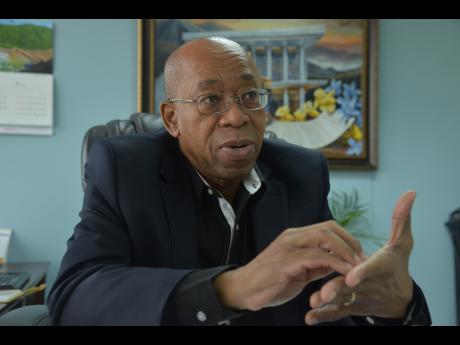PetroCaribe Fund transition - US$1.6b fund to flow into government coffers
In a matter of months, the US$1.6 billion, or more than J$208 billion, now in the PetroCaribe Development Fund (PDF) is to flow to the Consolidated Fund and could be administered as the Minister of Finance sees fit.
The transition is expected to happen by the end of the fiscal year, or by the time PDF Chief Executive Officer Dr Wesley Hughes leaves, that office when his contract expires next February.
Hughes told the Financial Gleaner that since about February this year, the finance ministry has had "preliminary discussions" with the PDF about the planned change in the structure of the fund that at its zenith managed more than US$3 billion in assets.
The talks, he said, mulled what form "integration" could take but arrived at no definitive conclusion. The PDF CEO pointed to the finance ministry as the source for any further questions about precisely how the fund, set up in law to service Jamaica's debt to Venezuela and provide development funding, would operate as part of the Government's central operations.
The finance ministry is yet to comment. Finance Minister Nigel Clarke is currently overseas engaging financial markets in a non-deal roadshow.
The PDF gets broad policy directions from the finance minister, but is largely an independent and self-financing entity, whose profits not only serviced Jamaica's oil debt to Venezuela, but invested, mainly via loans, in development projects. It has pumped more than $335 billion into the economy through project financing, equity investments, and social and economic development grants.
"The expectation is that the fund will become more integrated in the Ministry of Finance. It will continue to operate the elements of managing the loans that are in place and long-term debt repayment commitments to Venezuela," Hughes said. He, however, declined to speculate on the model by which these aims might be achieved.
In the April 2018 Article IV Consultation report on Jamaica, the International Monetary Fund (IMF) listed the integration of the PDF into Government's central operations as an outstanding item still to be undertaken by the Jamaican Government.
The IMF report gave a March 2019 date for the completion of the action, which, it said, was an undertaking by the Government dating back to the second standby agreement review in September 2017. Hughes said there was no discussion of this commitment with the PDF at that time.
The change in status of the PDF from a public body corporate to being administered as part of central government is part of a raft of policy measures mandated under the current IMF agreement. The measures include the merger of several government organisations, divestment of some public bodies, and stepped-up initiatives to reduce the size of the public sector and wage bill.
The end of the PDF, as it was established by law under a 2006 amendment to the Petroleum Act, is expected to require legislation in Parliament and, possibly, concurrence from Venezuela, given that the PetroCaribe agreement for the concessionary import of oil remains in force, despite the scaling down of shipments and Jamaica's massive reduction of its oil debt to Caracas. That debt is now at around US$120 million following the cash repayment of some US$1.5 billion three years ago, in a hugely discounted debt buy-back.
Hughes said closure of the fund was viewed as a possible strategic risk by its management in annual planning and financial projections.
As former chairman of the fund when he served as financial secretary in the finance ministry between 2009 and 2012, Hughes said the PDF was deliberately structured to complement the IMF staff monitoring arrangement that was in force in 2006, as well as to safeguard its mandate as political administrations change.
The insulation measures include the financial secretary's chairmanship of the board and ex-officio membership on the board, accorded to senior public sector officials, including the Cabinet secretary, the head of the Planning Institute of Jamaica, and permanent secretaries of several ministries, such as the Office of the Prime Minister and the ministry with responsibility for energy. About three members are appointed by the finance minister.
Hughes considers the structure, including its direct reporting to Parliament, as adhering to global best practice.
"It's not that we are not subject to political directives (but) for the most part these directives have been consistent with the Constitution, rules and regulations. After all, we are a public body; we are subject to Cabinet decisions," he said.
"Cabinet is the highest decision-making body in the country. If they take a decision, our job is not to question it, but to find out how best and effective we can be in implementing that decision. If you don't have that approach, anarchy is the outcome," he added.
He also believes that the structure "has worked", saying "we have found ourselves with sufficient room to do what we have to do to fulfil our mandates".
This article has been updated to clarify the composition of the PDF board.

